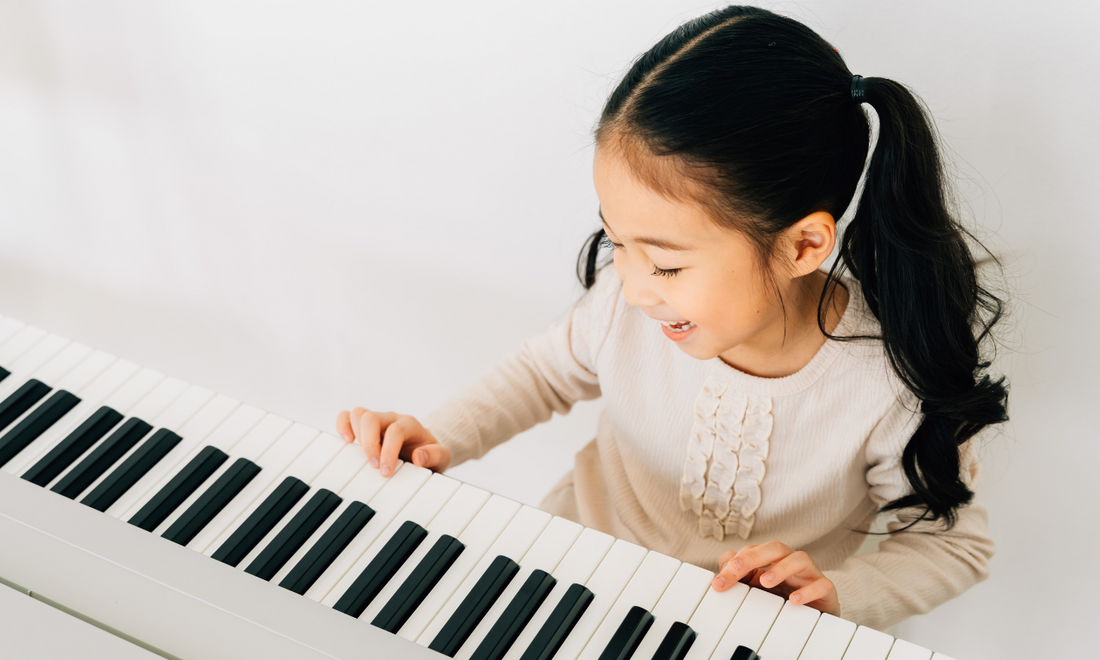
How old do children learn piano? Too small age affects muscle development [parents must see]
Share
abstract

"Should the children learn the piano?" "What should the children prepare before learning the piano?" I imagined the children playing the brisk minuet with their hands flying on the keys, but I was afraid that I would become a tiger father or a tiger who forced the children to practice the piano. mom?
Seeing that friends around you have sent children to learn the piano and shared videos of children playing the piano, do you want your children to learn the piano too? Feiteng Music solves your doubts about children learning piano!

The purpose of learning piano
Learning the piano not only cultivates temperament, but also cultivates characteristics
Learning the piano is not only about cultivating musical temperament and cultivating the body and mind, but also cultivating children's personality traits invisibly, so that children can use these traits in the learning of other things in the future. Learning the piano has the following benefits for children:
1. Train concentration and coordination: According to the analysis of Mr. Baldwin, an American music teacher, watching a single line of music can train children's attention; with the cooperation of the left and right hands, reading two lines of music and popping out the music can train children's coordination.
2. Train patience, ability to solve dilemmas, and self-confidence: Learning the piano is a long journey, and learning the piano can help children develop the patience of practice. When encountering difficult songs, finding ways to overcome them through practice can train children's ability to solve difficult situations. Learning the piano often requires proving your ability through competitions and tests. These all have to overcome the nervousness of playing in front of others, which can cultivate children's self-confidence.
3. Cultivate musical literacy: Learning the piano requires exposure to a large number of piano works, and listening to master performances, from which to learn the typhoon, speed, expressions, etc. of the performance, which can cultivate the quality of music appreciation and make children have temperament.
4. Promotes brain development: In addition to being more creative and perceptual thinking, children who learn music, according to a research report in the Proceedings of the National Academy of Sciences., learning piano can also help children improve their language skills. This is because The ears of children who learn piano are trained to distinguish different pitches and tones, which helps listening comprehension and distinguishes the differences between spoken and spoken languages.

piano learning age
The sooner you learn, the better? Ask your child if they are ready!
It is often heard that 3- and 4-year-old musical prodigies can play difficult music, so many people think that the sooner they learn the piano, the better. Even piano teachers often encounter parents with children in diapers learning the piano. In fact, learning piano is not the earlier the better, 5~15 years old is a better age.
Playing the piano requires the use of small muscle movements. If the baby is too young, the muscles are not fully developed, the coordination is slightly poor, and the piano keys are heavy. If the force is applied incorrectly, the baby's hands may be damaged. Furthermore, learning the piano requires that children can understand the teacher's instructions, sit for dozens of minutes, and have the ability to communicate and interact with the teacher. Therefore, 5 to 15 years old is a good age to learn piano.

Preparing children for piano lessons
So, what should you prepare before letting your child learn the piano?
1. Prepare parent and child mindset: The most important preparation before learning piano is not a good neighbor who can endure the noise of piano practice, but "the mentality of parents and children"! Parents can understand why their children learn, and the practice methods, teaching methods, and purchase budgets of “music exams” and “purely cultivating interests” are also different; children must be able to have the mentality of “wanting to learn well”, so that they do not need parents or parents. The teacher forced him to practice the piano spontaneously.
2. Prepare space and time for piano practice: Learning the piano requires persevering practice. Turn your storage room, warehouse, and living room into a piano room! It should be noted that the lighting of the piano practice space is sufficient or not, and try to choose a place that is not easily disturbed. If the light is dim, you can add a piano light to illuminate the score evenly, protect the children's eyes, and improve the efficiency of piano practice.
3. Prepare the piano: "Should I spend tens of thousands of dollars to buy a piano for my child?", "What if the child is not interested and stops playing?" The answers to these questions vary from person to person, depending on the child's purpose of learning the piano, There are different answers depending on the space at home and the budget for buying a piano. Buying a brand new upright or grand piano is best if circumstances permit. If you are afraid of making noise to your neighbors or your budget is low, you can buy a digital piano, you can adjust the volume, plug in headphones, and the touch feeling is closer to that of a piano (but there are still differences). The digital piano needs to buy the 88-key style, which is consistent with the general piano.

